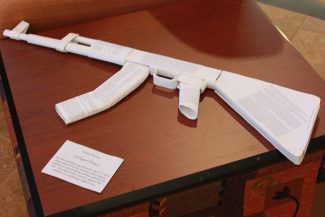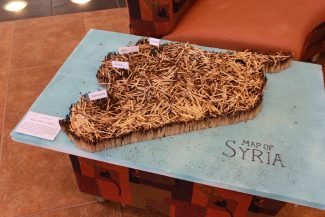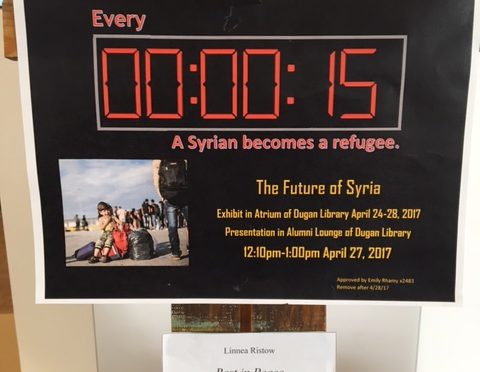The atrium in the Dugan Library was home to a student-created art exhibit over the course of April 24-28, 2017. The exhibit, titled “The Future of Syria,” included the work of five students who crafted pieces of art designed to depict the current hot topic of the conflicts evolving in Syria.

The honors section of the Comparative Genocide class, taught by Associate Professor of History Kelly McFall, Ph.D., made the choice to demonstrate what they had learned in the classroom by applying it to an issue that “matters now” through the creation of their artwork. According to McFall, the current conflict in Syria has arisen from ordinary people seeking a level of political power within a dictatorship and has thus resulted in a civil war being fought “extraordinarily brutally” on the part of the Syrian government. The existence of these brutalities in today’s world, which include torture, rape, executions, and chemical warfare, fuel McFall’s reasoning for allowing his students to present this exhibit on campus.
McFall said that working on this assignment was not just for the students in his classroom, but also for others across campus. According to McFall, this assignment “encourages [the students] to think about their world, and encourages them to share what they learned with other people so that other people and the whole campus can understand the world we live in a little bit better.”
Furthermore, McFall says, “At a Catholic university, whatever else we are or do, we should be concerned with how other people are treated across the globe.” Through the process of reading articles, watching documentaries, and listening to podcasts, McFall worked to ensure that his students were made aware of how this treatment was playing out in Syria. Students then used their own time to create artwork which shows aspects of the conflict they find most important.

The artwork displayed in the exhibit had a wide range of subject matter stretching from the bombings of schools and the deaths of innocent children to the lack of peace that exists within the everyday life of Syrian citizens.
McFall is extremely pleased with the work his students put into this project and their understanding of the associated issue. “This group of people have been enormously professional, enormously engaged, and tremendously motivated to understand a difficult situation and help other people understand what it means to them, and I couldn’t be happier with what they have done.”

